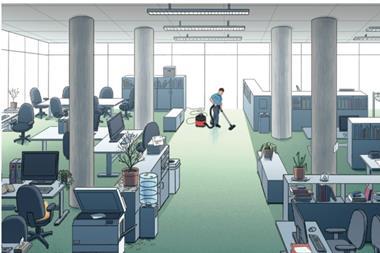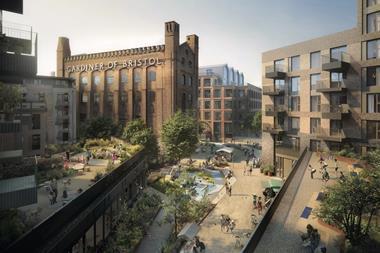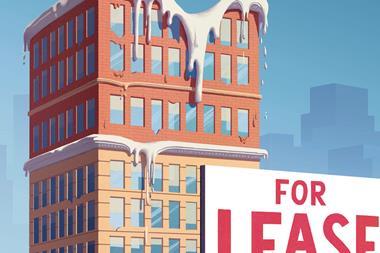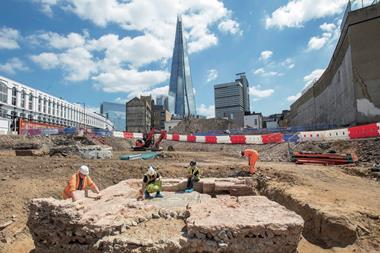In a post-COVID-19 world, office investors need to adapt to avoid a similar fate to the retail sector. Niall Gaffney introduces a new concept devised in Dublin
Many industries have experienced significant structural shifts due to the digital revolution over the past few decades. One of the most profoundly affected has been the retail sector, with the rise of e-commerce. We have seen the acute impact of this within our own industry, with retail property valuations suffering as more and more consumers opt for online shopping over visits to their local high streets or shopping centres, and industrial property conversely winning out. The COVID-19 pandemic may be the final blow for many retail businesses as the lockdown measures have accelerated the structural shifts already underway.
While investors in the retail property sector seem to have had a monopoly on misfortune in recent years, the pandemic has had an indiscriminate impact on the real estate sector as a whole, to a greater or lesser extent.
Owners of office buildings have been dragged into the spotlight as strict work-from-home directives, which were initially intended to only last a few weeks, have now been in place for the best part of eight months. These restrictions have left what are normally bustling business districts across Berlin, Dublin, London and Paris lying empty.
Prior to the pandemic, there were already signs of a shift towards an increase in flexible working practices which enabled employees across many office-based businesses to work remotely. However, these practices were never tested at scale until governments, including those in France, Germany, Ireland and the UK, shut down office buildings and mandated people to work from home as a response to COVID-19. What felt like the beginning of a mass flexible working experiment in March has proven to be successful, with the benefits of digital connectivity making themselves felt at scale.
In a YouGov survey of 1,300 UK office workers, undertaken in the middle of the first lockdown as part of our annual thought leadership report – Making Place, the Recalibration of Work, Life and Place – only 11% of respondents indicated that they would prefer to work in an office most of the time, while 50% would like to split their week equally between the office and the home in the future. This clearly suggests that the shift to office-based workers splitting more of their time between home and work is likely to be a permanent one, something that investors are paying attention to as it brings into question the ‘future of the office’.
Should investors be concerned? In a word, no; but there is a clear need for recalibration to ensure that the long-term resilience of the commercial property sector is safeguarded and future-proofed. Failure to do so could lead to assets becoming unfit for purpose – a fate faced by many retailers that were not quick enough to react to the threat posed by e-commerce. Simply put, the mono-functional office is dead. We can no longer continue to build the same office buildings that have dominated the urban landscape for the past two decades.
In the same YouGov survey, 84% of respondents advocated the social and personal benefits of office working, while 79% also said there were professional benefits that could be missed out on when working from home. Offices clearly have their place and are embedded in the day-to-day ecosystem of the urban environment, but the majority of these buildings, which make up a significant percentage of commercial property globally, have not evolved to today’s working mindset.
There is now an urgent need for office owners to ensure that post-COVID office buildings and the surrounding neighbourhoods are relevant and more appealing to a new digitally enabled workforce – to protect their values and maintain their important economic, cultural and social function in our cities.
As the largest owner of office buildings in Dublin, we conducted extensive research into how we can future-proof our assets in the city against short-term market fluctuations, ensuring they remain relevant and resilient for the long term. As part of our sustainable and responsible investment strategy, we identified the necessity for a new approach, a new way of thinking and design, which puts placemaking at the centre. This is a movement we call workplacemaking. This approach will underpin an enhanced experience for our occupiers and the local community, and importantly it is this viability that translates into financial resilience for investors.
Workplacemaking, which has been identified through extensive research, is both a commercial and a community design practice with a triple bottom line for every stakeholder. Companies benefit from the bringing together of employees around shared tasks, and from the exposure of employees to other industries and diverse experiences that lead to more creative problem-solving. Cities benefit from the socialising of citizens with different backgrounds, skills, and outlooks, and from the knowledge spill-over that these interactions create between industries. Commercial developers benefit from the making of more desirable assets, that are more resistant to the fluctuations of the market by taking root in the needs of people and place.
Private-sector developers and investors have an important role to play in ensuring that offices meet the needs of a post-COVID-19 world. Those that heed the call and take action now will contribute to the future value and the longevity of their investments. Those that fail to act may find themselves left behind and suffering the same fate as the retailers that were too slow to adapt.
Supporting documents
Click link to download and view these filesIPUT_MakingPlace_Report 10 Nov 2020
PDF, Size 13.2 mb


















